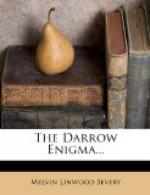I am parting, broken,
parting,
From a soul that I hold
dear,
And the music of whose
beauty
Fades a dead strain
on my ear.
I am dying, sweetheart,
dying,
Drips life’s gold
through palsied hands,—
See; the dead’ning
Sun is sighing
His last note in red’ning
bands.
So I’m sighing,
sinking, sighing,
Flows life’s river
to the sea.
Death my throbbing heart
is tying
With the strings that
ache for thee.
“Yes,” I said, when he had finished. “I shall have to admit that immediately suggests Higginson’s poem and Cleopatra’s name. But here, try this,” and I threw an old copy of the Atlantic Monthly upon the table. Maitland opened it and laughed. “This may be mere chance, Doc,” he said, “but it is remarkable, none the less. See here!” He held the magazine toward me, and I read: “Cleopatra’s Needle. The Historic Significance of Central Park’s New Monument. Some of the Difficulties that Attended its Transportation and Erection. By James Theodore Wright, Ph. D.” I was dumfounded. Things were indeed getting interesting.
“Magazines and newspapers,” I said, “seem to be altogether too much in your line. We’ll try a book this time. Here,” and I pulled the first one that came to hand, “is a copy of Tennyson’s Poems I fancy it will trouble you to find your reference in that.” Maitland took it in silence, and, opening it at random, began to read. The result surprised him even more than it did me. He had chanced upon these verses from “A Dream of Fair Women”:
“’We drank the Libyan
Sun to sleep, and lit
Lamps which outburn’d
Canopus. O my life
In Egypt! O the
dalliance and the wit,
The flattery and the
strife.
“’And the wild kiss
when fresh from war’s alarms,
My Hercules, my Roman
Antony,
My mailed Bacchus leapt
into my arms,
Contented there to die!
“’And there he died!
And when I heard my name
Sigh’d forth with
life, I would not brook my fear
Of the other!
With a worm I balked his fame.
What else was left?
look here!’
“With that she tore
her robe apart and half
The polished argent
of her breast to sight
Laid bare. Thereto
she pointed with a laugh,
Showing the aspic’s
bite.”
“There is no doubt about that,” I said, as he laid the book upon the table. “I want to try this thing once more. Here is Pascal; if you can find any reference to the ‘Serpent of the Nile’ in that, you needn’t go any farther, I shall be satisfied,” and I passed the book to him. He turned the pages over in silence for half a minute, or so, and then said: “I guess this counts as a failure,—no, though, by Jove! Look here!” His face was of almost deathly pallor, and his finger trembled upon the passage it indicated as he held the book toward me. I glanced with some anxiety from his face to the book, and read, as nearly as I now can remember: “If Cleopatra’s nose had been shorter, the entire face of the world would have been changed.”




